Mild aortic stenosis - Study guides, Class notes & Summaries
Looking for the best study guides, study notes and summaries about Mild aortic stenosis? On this page you'll find 1854 study documents about Mild aortic stenosis.
Page 3 out of 1.854 results
Sort by
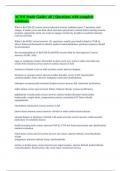
-
ACSM Study Guide: all || Questions with complete solutions.
- Exam (elaborations) • 42 pages • 2024
- Available in package deal
-
- $14.69
- + learn more
What is the PAR-Q? correct answers physical activity readiness quest; 7 questions, don't change, if marks yes to one then client must have physician's consent before starting exercise program; appropriate when one wants to engage exclusively in light-to-moderate intensity exercise activities What is the HSQ? correct answers 10+ questions, usually goes hand in hand w/ PAR-Q, allows fitness professionals to identify medical contraindications, pertinent responses should be documented the re...
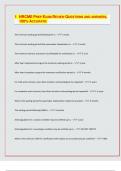
-
NRCME PREP EXAM REVIEW QUESTIONS AND ANSWERS, 100% ACCURA| latest 2024/25 exams updates |TE/
- Exam (elaborations) • 9 pages • 2024
-
Available in package deal
-
- $8.49
- + learn more
NRCME PREP EXAM REVIEW QUESTIONS AND ANSWERS, 100% ACCURATE/ The minimum waiting period following PCI is: - -1 week The minimum waiting period after pacemaker implantation is: - -1 month The maximum thoracic aneurysm size allowable for certification is: - -3.5 cm After heart replacement surgery the minimum waiting period is: - -1 year After heart transplant surgery the maximum certification period is: - -6 months For mild aortic stenosis, how often should an echocardiogram be repeated? - ...
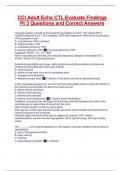
-
CCI Adult Echo CTL Evaluate Findings Pt 3 Questions and Correct Answers
- Exam (elaborations) • 34 pages • 2024
-
- $13.99
- + learn more
The peak systolic velocity of the tricuspid regurgitation is 4m/s. The systolic BP is 120/80mmHg and the 2.7 IVC collapses <50% with respiration. What level of pulmonary HTN is present if any? A: no pulmonary HTN is present B: mild pulmonary HTN C: moderate pulmonary HTN D: severe pulmonary HTN D: severe pulmonary HTN Feedback: RVSP = (V x V) + RAP RAP is estimated at 15mmHg with reduced respiratory collapse of the dilated IVC. RVSP= 4(4x4)+15=79mmHg=severe Ankylosing spondylitis and Loeys- ...
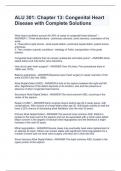
-
ALU 301: Chapter 13: Congenital Heart Disease with Complete Solutions
- Exam (elaborations) • 5 pages • 2024
-
Available in package deal
-
- $10.99
- + learn more
ALU 301: Chapter 13: Congenital Heart Disease with Complete Solutions ALU 301: Chapter 13: Congenital Heart Disease with Complete Solutions ALU 301: Chapter 13: Congenital Heart Disease with Complete Solutions What heart conditions account for 80% of cases of congenital heart disease? - ANSWER-1. Three obstructions - pulmonary stenosis, aortic stenosis, coarctation of the aorta. 2. Three left-to-right shunts - atrial septal defect, ventricular septal defect, patent ductus arteriosus....
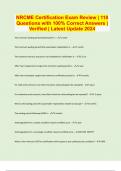
-
NRCME Certification Exam Review | 110 Questions with 100% Correct Answers | Verified | Latest Update 2024
- Exam (elaborations) • 9 pages • 2024
- Available in package deal
-
- $8.49
- + learn more
The minimum waiting period following PCI is: - 1 week The minimum waiting period after pacemaker implantation is: - 1 month The maximum thoracic aneurysm size allowable for certification is: - 3.5 cm After heart replacement surgery the minimum waiting period is: - 1 year After heart transplant surgery the maximum certification period is: - 6 months For mild aortic stenosis, how often should an echocardiogram be repeated? - 5 years For moderate aortic stenosis, how often should an echocardi...
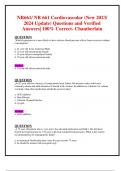
-
NR661/ NR 661 Cardiovascular (New 2023/ 2024 Update) Questions and Verified Answers| 100% Correct- Chamberlain
- Exam (elaborations) • 38 pages • 2023
-
Available in package deal
-
- $11.99
- + learn more
NR661/ NR 661 Cardiovascular (New 2023/ 2024 Update) Questions and Verified Answers| 100% Correct- Chamberlain QUESTION Which hypertensive is most likely to have adverse blood pressure effects from excessive sodium consumption? a. 21 year old Asian American Male b. 35 year old menstruating female c. 55 year old post menopausal female d. 70 year old african american male Answer: d. 70 year old african american male QUESTION An 87 year old has a history of symptoma...
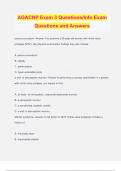
-
AGACNP Exam 3 Questions/Info Exam Questions and Answers
- Exam (elaborations) • 37 pages • 2024
- Available in package deal
-
- $13.49
- + learn more
AGACNP Exam 3 Questions/Info Exam Questions and Answers pectus excavatum -Answer-You examine a 24-year-old woman with mitral valve prolapse (MVP). Her physical examination findings may also include: A. pectus excavatum B. obesity C. petite stature D. hyper-extensible joints a mid- to late-systolic murmur -Answer-In performing a cardiac examination in a person with mitral valve prolapse, you expect to find: A. an early- to mid-systolic, crescendo-descrendo murmur. B. a pansystolic murm...
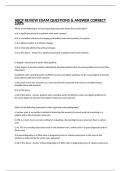
-
ABCP REVIEW EXAM QUESTIONS & ANSWER CORRECT 100%
- Exam (elaborations) • 178 pages • 2024
-
- $20.49
- + learn more
Which of the following is not true regarding peak aortic blood flow acceleration? a) it is significant primarily in patients with aortic stenosis b) it is a sensitive indicator of changing contractility state and secondary to hypoxia c) it is highly sensitive to inotropic changes d) it is minimally affected by preload changes e) 2 of the above - Answer it is significant primarily in patients with aortic stenosis In doppler assessment of aortic valve gradient: a) the degree of stenosis...
![ARDMS EXAM PREP REVIEW QUESTIONS AND ANSWERS. GRADED A+/ VERIFIED.[LATEST EXAM UPDATES]](/docpics/5730776/667f09d9ae5ec_5730776_121_171.jpeg)
-
ARDMS EXAM PREP REVIEW QUESTIONS AND ANSWERS. GRADED A+/ VERIFIED.[LATEST EXAM UPDATES]
- Exam (elaborations) • 15 pages • 2024
-
- $9.99
- + learn more
ARDMS EXAM PREP REVIEW QUESTIONS AND ANSWERS. GRADED A+/ VERIFIED. A cause for acute mitral regurgitation might be: A. mitral stenosis B. infective endocarditis C. aortic stenosis D. hypertrophic cardiomyopathy - - -B A common electrical abnormality seen in patients with a DCM is: A. heart blocks B. atrial tachycardia C. sinus bradycardia D. conduction defects - - -D A finding of holodiastolic flow reversal in the descending aorta may be a false positive finding of severe aortic re...
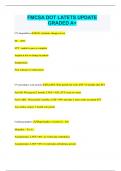
-
FMCSA DOT LATETS UPDATE GRADED A+
- Exam (elaborations) • 19 pages • 2023
- Available in package deal
-
- $9.99
- + learn more
FMCSA DOT LATETS UPDATE GRADED A+ CV disqualifiers ECG- Ischemic changes at rest EF - <40% ETT - unable to pass or complete Angina at rest or change in pattern Symptomatic Poor tolerance of medications CV procedures wait periods Post PCI- Wait period one week, ETT 3-6 months after PCI Post MI- Wait period 2 months, LVEF > 40%, ETT every two years Post CABG - Wait period 3 months, LVEF >40% and after 5 years needs an annual ETT Any cardiac surgery 3 month wait period Cardiomyopathies H...

That summary you just bought made someone very happy. Also get paid weekly? Sell your study resources on Stuvia! Discover all about earning on Stuvia


